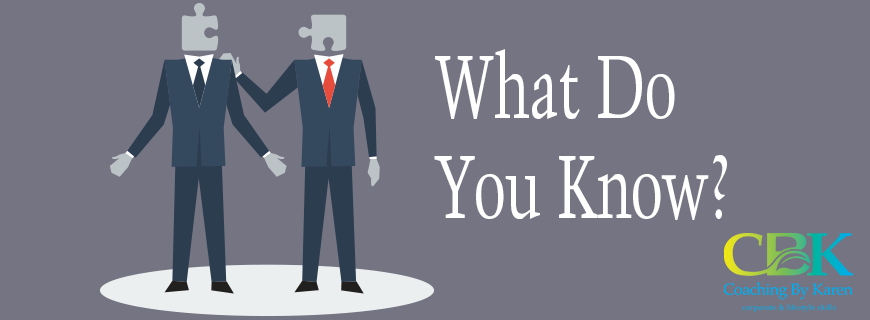What Do You Know?

Communication is a major part of life, especially in this day and age when we are connected 24/7. But, email, text, and social media posts do little to increase our TRUE communication with each other because they don’t really encourage us to engage our emotional intelligence.
A quick look on Facebook and you’ll see a multitude of people who are definitely not self-regulating. Read people’s comments on news articles and you’ll find the lack of empathy sometimes seems like it’s reaching epidemic proportions. Attend a networking event and start counting all the people who spend more time looking at their phone than talking to the people in front of them. Overall, as a society, our communication skills are definitely in need of an overhaul. But, where do we start?
Recently, I was talking with a colleague and realized how natural and easy it felt. She seemed to really relate to my thoughts and ideas, and I appreciated her observations and suggestions. Later, as I replayed our conversation in my head, I realized she often used the phrase, “I understand.”
For instance:
Me: “Sometimes I am just so busy with clients and preparing to offer a workshop that I forget to take care of myself and do the things that keep me balanced and healthy.”
Her: “Oh, I understand. It’s crazy how the times we most need to engage in taking care of our health are the times we are least likely to.”
By saying “I understand” instead of “I know” she not only validated my feelings but created a connection where it seemed like she, too, had experienced the same thing. So often, when we relate to what someone is saying, we say “I know.” And, while it’s true, we may “know,” it doesn’t show much empathy. Actually, when you think about it, “I know” is rather egocentric in nature, where “I understand” is compassionate.
Now, don’t get me wrong, there are times when “I understand” is not the right thing to say. If someone is experiencing a really negative event such as depression, a major illness, or death of someone close, to say “I understand how you feel” may not have the supportive tone you are hoping for. In those cases, we don’t really understand how they feel, and it can come across as uncaring or condescending. The stronger EQ response would be something like “I am sure it’s very difficult, please let me know if there’s anything I can do to help.” Or, “I don’t really know what to say, but please know that if I can do anything, I am here for you.”
Empathetic communication skills can completely change how people relate to us, and us to them.

